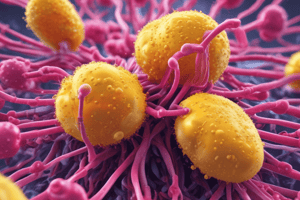Podcast
Questions and Answers
What is the characteristic feature of shock syndrome?
What is the characteristic feature of shock syndrome?
- Normal cellular metabolism
- Increased tissue perfusion
- Excessive metabolic activity
- Imbalance in supply/demand for O2 and nutrients (correct)
Which type of shock is characterized by systolic or diastolic dysfunction and compromised cardiac output?
Which type of shock is characterized by systolic or diastolic dysfunction and compromised cardiac output?
- Obstructive Shock
- Hypovolemic Shock
- Distributive Shock
- Cardiogenic Shock (correct)
What does SIRS stand for in the context of shock syndrome?
What does SIRS stand for in the context of shock syndrome?
- Systemic Injury Recovery Syndrome
- Systemic Immunodeficiency Response Syndrome
- Systemic Infection Resistance Syndrome
- Systemic Inflammatory Response Syndrome (correct)
What is the defining feature of MODS (Multiple Organ Dysfunction Syndrome)?
What is the defining feature of MODS (Multiple Organ Dysfunction Syndrome)?
Which type of shock is characterized by loss of intravascular fluid volume due to hemorrhage or GI loss?
Which type of shock is characterized by loss of intravascular fluid volume due to hemorrhage or GI loss?
Which type of shock is characterized by a hemodynamic phenomenon and can occur within 30 minutes of a spinal cord injury at the fifth thoracic (T5) vertebra or above?
Which type of shock is characterized by a hemodynamic phenomenon and can occur within 30 minutes of a spinal cord injury at the fifth thoracic (T5) vertebra or above?
What are the clinical manifestations of anaphylactic shock?
What are the clinical manifestations of anaphylactic shock?
What are the three major pathophysiologic effects in septic shock?
What are the three major pathophysiologic effects in septic shock?
What is the cause of obstructive shock?
What is the cause of obstructive shock?
What is a characteristic clinical manifestation of distributive shock that occurs due to spinal cord injury or spinal anesthesia?
What is a characteristic clinical manifestation of distributive shock that occurs due to spinal cord injury or spinal anesthesia?
Flashcards are hidden until you start studying




